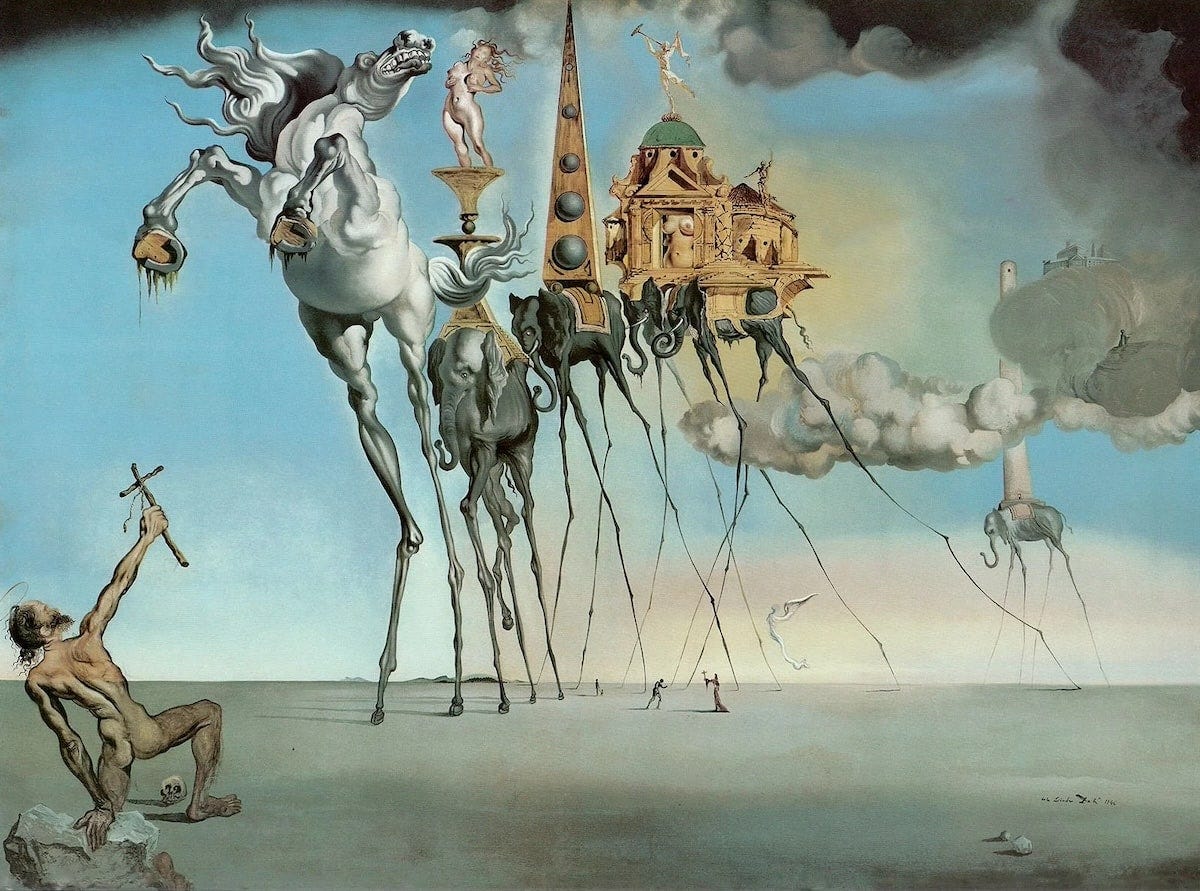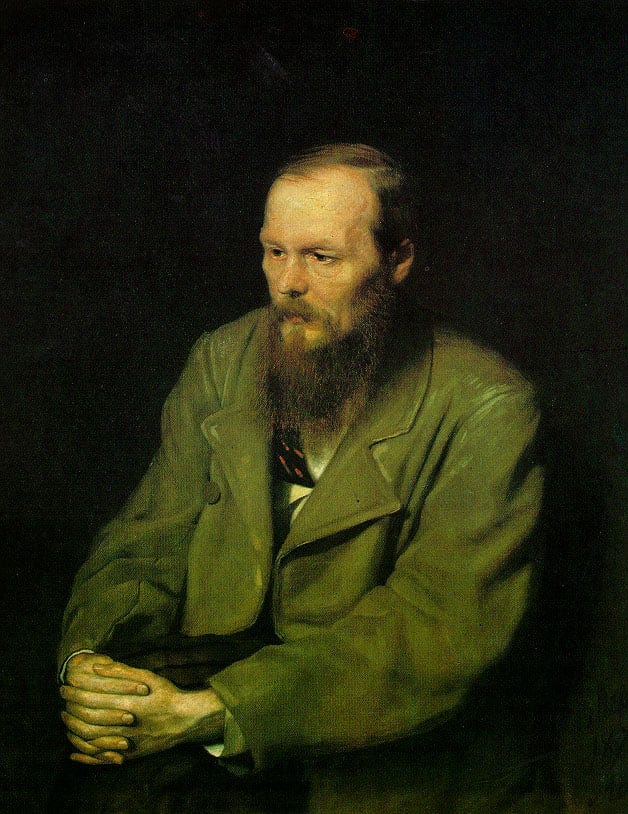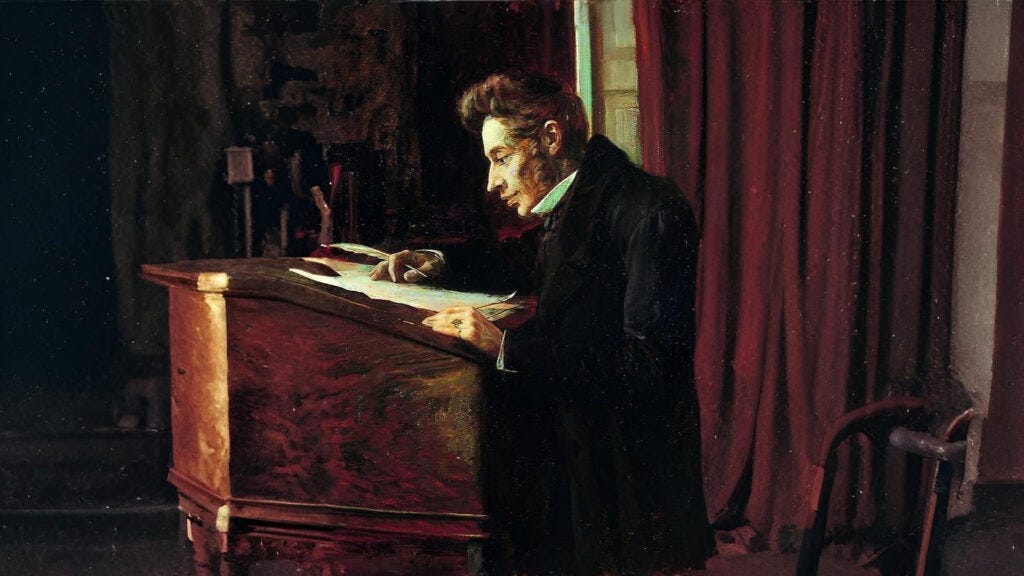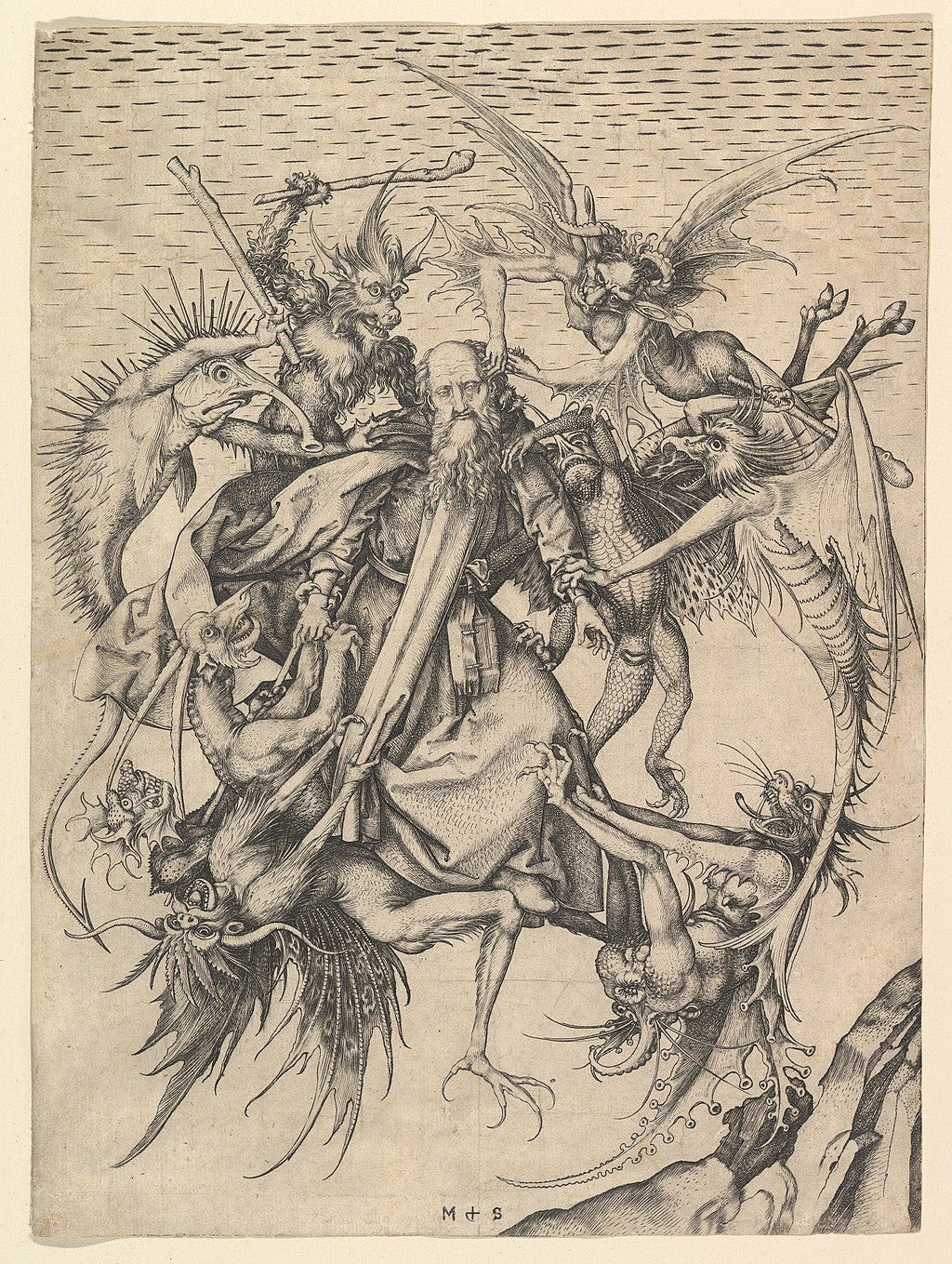The War for Your Soul
Understanding spiritual battle in modern life...
Ancient Accusation
“Have you considered my servant Job, that there is none like him on the earth, a blameless and upright man who fears God and turns away from evil?” - Job 1:8
When God poses this question to Satan, it sparks a spiritual confrontation. Satan’s response is chilling in its clarity: Job’s faithfulness, he insists, is dependent on comfort and security.
“Stretch out your hand,” Satan challenges, “and touch all that he has, and he will curse you to your face.”
With these words, a spiritual war begins. The question at stake is simple yet profound: will Job remain faithful when his life is stripped of comfort, blessing, and peace? It is a test of love and loyalty, of integrity when all else is lost.
This ancient story is no mere myth. Rather, it reveals something critical about our own lives. Our souls are each contested, each decision a skirmish in a battle older than humanity itself.
Genius, Madness, and Spirit
It is commonly said that genius walks hand-in-hand with madness. History gives countless examples: great artists, philosophers, saints, and mystics often experienced deep anguish alongside their gifts. Michelangelo struggled with profound melancholy. Dostoevsky battled haunting despair. St. Teresa of Ávila endured years of spiritual torment before attaining clarity and union with God.
Why such suffering among the brightest minds and purest hearts?
The Christian tradition has always known the answer. Genius, whether artistic, intellectual, or spiritual, is dangerous to the powers of darkness. The brighter the spiritual potential, the more fierce the resistance. Demonic forces do not waste their time tempting souls already surrendered to apathy. Rather, they attack those who pursue truth, beauty, and holiness.
In The Screwtape Letters, C.S. Lewis writes:
“Indeed, the safest road to Hell is the gradual one, the gentle slope, soft underfoot, without sudden turnings, without milestones, without signposts.”
Evil most powerfully targets those who stand apart from this gradual descent, who resist the passive comfort of spiritual decay. Saints and seekers do not suffer because they are weak, but precisely because they threaten spiritual complacency.
The more brightly your soul shines, the greater a target you become.
Progress, Potential, and Spiritual Peril
We live in an age where everything seems within our reach. Technology promises limitless knowledge, limitless comfort, limitless distraction. Yet, paradoxically, this unprecedented access to potential has not made us morally or spiritually stronger. Instead, vice, anxiety, and despair flourish openly.
Why has evil intensified? Or has it simply become more visible?
History provides perspective. In periods of significant human advancement, Renaissance, Enlightenment, Industrial Revolution, spiritual struggles also intensified. With greater possibilities for human flourishing come greater possibilities for corruption.
This dynamic was captured by Dostoevsky in his prophetic novel, The Brothers Karamazov. He saw clearly how modern man, empowered by science and intellect, would face spiritual ruin if separated from God. “If God does not exist,” Dostoevsky wrote, “everything is permitted.” He understood that the spiritual battle intensifies as humanity’s freedom and potential grow.
The paradox is clear: greater freedom means greater responsibility, and greater responsibility invites greater spiritual attack. Evil escalates its assault because the stakes, the potential good humanity can achieve, are higher than ever.
The Enemy Within Your Mind
Many philosophers have noted that the battle between good and evil plays out most vividly in the human mind. Søren Kierkegaard, the Danish Christian thinker, explained this conflict eloquently in The Sickness Unto Death. He believed despair was humanity’s primary spiritual illness. Despair, for Kierkegaard, is the refusal to be oneself before God, a profound rejection of our created nature and divine calling.
Today, our culture offers countless ways to evade facing our true selves. Screens numb our attention. Algorithms dictate our desires. Social media cultivates envy and despair disguised as entertainment. These distractions become substitutes for the sacred.
We no longer openly worship false gods of bronze or stone. Instead, we worship comfort, approval, convenience, and distraction. These modern idols promise freedom, yet enslave us quietly, comfortably.
In the Gospel of Matthew, Christ warns:
“Enter by the narrow gate. For the gate is wide and the way is easy that leads to destruction, and those who enter by it are many.” - Matthew 7:13
The easy path is crowded precisely because it demands nothing from us. Yet it leads nowhere but emptiness. The narrow way, the way of spiritual warfare, demands constant vigilance and disciplined choices.
This path is hard but ultimately it leads to true freedom.
Free Will and the Worth of Your Soul
God created humanity with freedom precisely because real love cannot exist without choice. He does not force us into obedience. Rather, He invites us into relationship. Satan understood this well when challenging Job’s fidelity: if God’s blessings were removed, would Job still choose faithfulness freely?
This is the eternal wager, repeated in each human life. God places confidence in us. Evil places temptation before us. Both see clearly that your soul matters profoundly.
St. Augustine once wrote:
“God who created you without you, will not save you without you.”
Salvation involves our active participation. We must choose the good freely, often painfully. Each small decision against temptation strengthens us for the greater spiritual trials ahead.
Consider carefully the weight of your choices. Sin is subtle. It begins quietly, small compromises escalating until we barely recognize ourselves. Likewise, holiness is built through quiet, hidden acts of obedience, courage, and humility.
Both good and evil see your eternal worth. Both fight intensely over your soul, because both recognize you bear God’s image.
The Courage to Choose
Spiritual warfare is real. This struggle is not reserved for monks, mystics, or theologians. It involves every soul, including yours. The enemy is cunning, adapting to the age. Vice and temptation today come softly through subtle means: endless scrolling, easy pleasure, quiet despair.
Yet we are not powerless. Scripture assures us:
“Resist the devil, and he will flee from you. Draw near to God, and he will draw near to you.” - James 4:7–8
Resistance requires intentionality. Commit yourself to daily prayer, silence, fasting, reading Scripture, and acts of mercy. Reject passivity and spiritual complacency. Embrace discipline. Become vigilant about your habits, your influences, your small choices.
Remember Job. His battle was immense, but he remained faithful. His story ends not with despair, but with renewal. God restored him abundantly, not as payment for suffering, but as evidence that faithfulness endures.
Your life is no less significant. Your battle, no less real.
Choose how you will live. Choose courageously, humbly, consciously. Evil will whisper lies, offering shortcuts, pleasures without cost. Do not be fooled. These promises are empty.
God trusts you enough to allow spiritual testing. Trust Him enough to endure faithfully.
A Final Reflection
In the spiritual war for your soul, both sides recognize your worth. Satan attacks precisely because he sees your potential. God permits trials precisely because He believes in your ability to withstand and grow stronger.
Your choices shape your eternity. Stand firm, fight well, and choose wisely.
The battle is intense, but the outcome is not uncertain. Christ promises ultimate victory to those who persevere:
“In the world you will have tribulation. But take heart; I have overcome the world.” - John 16:33
Live with intention, aware of the war around you. Your soul is contested because your soul is great.
You are worth fighting over. The choice is yours.









"The man who truly and disinterestedly enjoys any one thing in the world, for its own sake, and without caring two-pence what other people say about it, is by that very fact forearmed against some of our subtlest modes of attack."
-- Screwtape (from C.S. Lewis's book 'The Screwtape Letters')